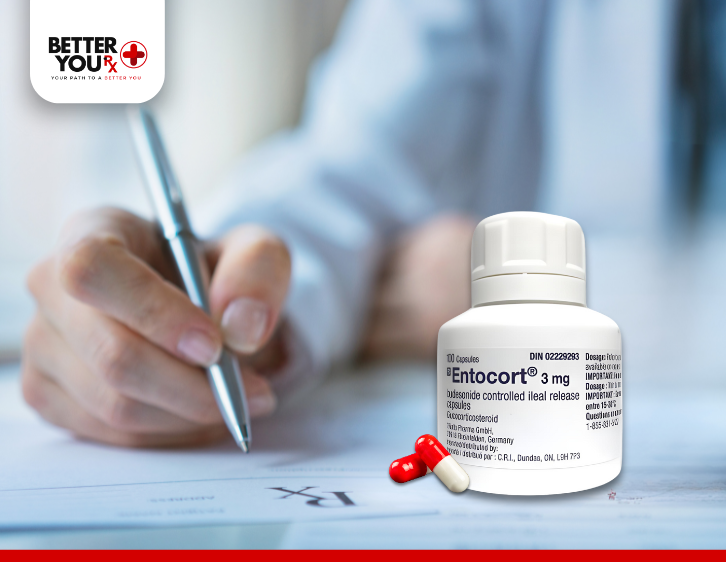
Wegovy vs Ozempic: Which Semaglutide Option Is Right for You in 2025?
Key Takeaways Wegovy: Designed for weight loss with a higher semaglutide dosage. Ozempic: Primarily for type 2 diabetes management. Cost: Wegovy is
SAVE 10% OFF First Order With Coupon Code: happyhealth
Living with a chronic condition like Crohn’s disease or ulcerative colitis can often feel like navigating a labyrinth of uncertainty. One medication that frequently surfaces in discussions is Entocort. If you’re seeking relief from the debilitating inflammation that accompanies these conditions, understanding how quickly Entocort works is vital. Let’s explore what this medication is, how it operates, and when you can expect to feel its effects!

At its core, Entocort is a powerful medication designed to treat Crohn’s disease and ulcerative colitis—two chronic inflammatory conditions that can cause significant gastrointestinal distress. Think of Entocort as your ally in combating inflammation, aiming to alleviate the painful symptoms associated with these conditions. By tackling inflammation directly in the intestines, Entocort opens the door to a more manageable and comfortable life, allowing you to reclaim your daily routine.
So, what’s the secret sauce behind Entocort? The magic lies in its active ingredient, Budesonide. Unlike traditional corticosteroids that are absorbed throughout the body, Budesonide takes a more targeted approach. It is specifically formulated to act locally within the intestines. This innovative method minimizes systemic side effects while effectively reducing inflammation. By lowering the activity of inflammatory messengers in the body, Budesonide provides relief from the painful symptoms of inflammatory bowel disease (IBD).

You may be wondering, “How long does Entocort take to work?” For many patients, significant improvements often begin to manifest within three weeks of initiating treatment. However, it’s essential to remember that achieving full benefits may take up to eight weeks. This timeline can vary based on individual responses, but the key is patience. Regular check-ins with your healthcare provider during this period can help monitor your progress and ensure that the medication is working effectively.
As with any medication, it is essential to be mindful of possible side effects. While most people tolerate Entocort well, some may experience headaches, nausea, or fatigue. More serious effects, like mood changes or elevated blood sugar levels, can occur too. Communication with your healthcare provider is key—keep them in the loop about any side effects you experience so they can help manage your treatment plan effectively.
If you’re already taking other medications, the question of interactions is vital. Make sure to inform your healthcare provider of all the prescriptions, over-the-counter drugs, and supplements you’re using. This transparency ensures that your treatment plan is safe and minimizes the risk of adverse interactions, allowing Entocort to work effectively alongside other medications.
Let’s talk about your diet—specifically, what you should avoid while on Entocort. If you enjoy grapefruit, it might be time to say goodbye to it for a while. Grapefruit and its juice can interfere with how Budesonide is metabolized, potentially reducing its effectiveness. Always consult your healthcare provider about dietary restrictions to optimize your medication’s impact.
Determining the correct dosage of Entocort is essential for effective treatment. Generally, the standard prescription is 9 mg taken once daily, with treatment typically lasting eight weeks. However, it’s crucial not to self-adjust your dosage without consulting your physician. Your doctor will tailor your dosage based on your specific needs and response to the medication, ensuring you get the most benefit while minimizing risks.
Safety is a primary concern for many patients, particularly those who are pregnant or breastfeeding. Budesonide is generally considered safe for use during pregnancy, but it’s imperative to discuss your individual circumstances with your healthcare provider. This dialogue will help you make informed decisions that prioritize the well-being of both mother and child.
Understanding the long-term implications of any medication is vital for ongoing management of IBD. While Entocort is often safer than traditional systemic corticosteroids, long-term use may still carry risks, including adrenal suppression or osteoporosis. Regular monitoring by your healthcare provider can help mitigate these risks, ensuring that your treatment remains effective without compromising your overall health.
If you feel it’s time to stop taking Entocort, it’s crucial not to do so abruptly. Sudden cessation can lead to withdrawal symptoms and destabilize your condition. Consult your healthcare provider to develop a tapering plan that allows for a gradual reduction in dosage, ensuring a smoother transition and continued stability in your health.
Navigating the complexities of managing Crohn’s disease and ulcerative colitis with Entocort can be challenging, but understanding this medication empowers you to take charge of your treatment journey. If you’re considering Entocort for your condition, Better You Rx offers an accessible way to obtain your prescription needs. With their commitment to quality, you can trust that you’re receiving a reliable treatment option that aligns with your health goals.
Don’t let IBD dictate your life—embrace the opportunity for relief and restoration. Explore your options and find out how Entocort from Better You Rx can help you reclaim your well-being!

Key Takeaways Wegovy: Designed for weight loss with a higher semaglutide dosage. Ozempic: Primarily for type 2 diabetes management. Cost: Wegovy is

Key Takeaways Ozempic and semaglutide offer powerful benefits for blood sugar control and weight loss. Weekly injections are easy to manage with

Key Takeaways Proper injection technique and site rotation are crucial for minimizing discomfort and ensuring effective medication absorption. The abdomen, thigh, and